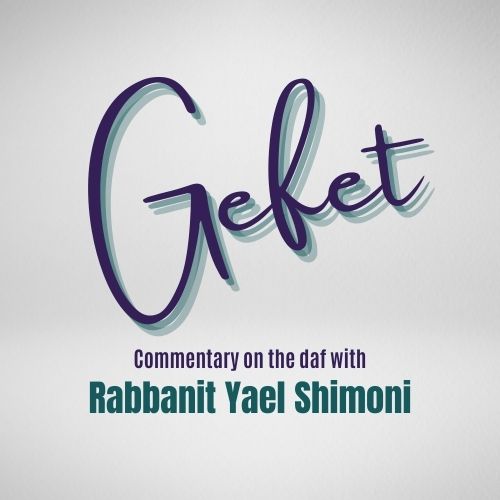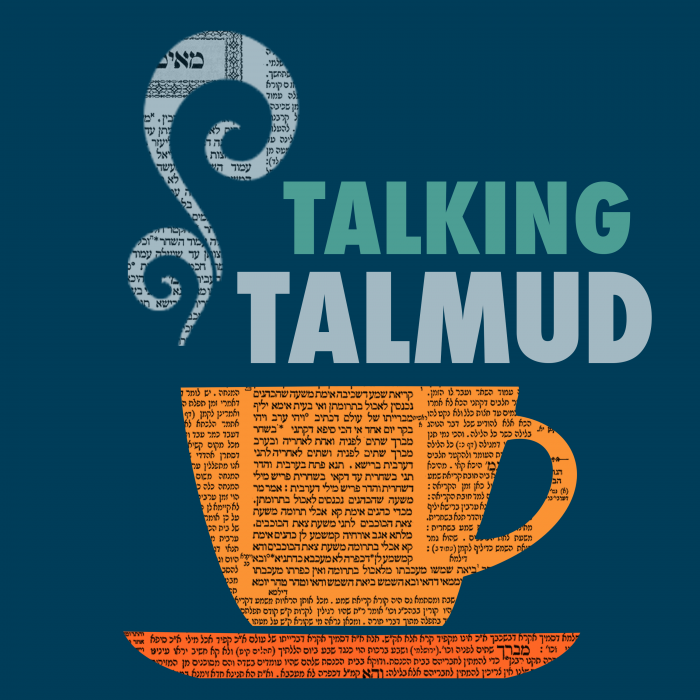Gittin 2
הַמֵּבִיא גֵּט מִמְּדִינַת הַיָּם, צָרִיךְ שֶׁיֹּאמַר בְּפָנַי נִכְתַּב וּבְפָנַי נֶחְתַּם.
MISHNA: An agent who brings a bill of divorce [get] from a husband to his wife from a country overseas, i.e., from outside of Eretz Yisrael to Eretz Yisrael, is required to state the following formula when he hands over the bill of divorce: This bill of divorce was written in my presence and it was signed in my presence.
רַבָּן גַּמְלִיאֵל אוֹמֵר: אַף הַמֵּבִיא מִן הָרְקָם וּמִן הַחֶגֶר. רַבִּי אֱלִיעֶזֶר אוֹמֵר: אֲפִילּוּ מִכְּפַר לוּדִּים לְלוֹד.
Rabban Gamliel says: Even one who brings a bill of divorce from Rekem or from Ḥeger, which are on the periphery of Eretz Yisrael, must make this declaration. Rabbi Eliezer says: Even one who brings a bill of divorce from the village of Ludim to Lod must also make this declaration, despite the fact that these places are only a short distance apart. The reason is that the village of Ludim was not part of the main area settled by Jews in Eretz Yisrael.
וַחֲכָמִים אוֹמְרִים: אֵינוֹ צָרִיךְ שֶׁיֹּאמַר ״בְּפָנַי נִכְתַּב וּבְפָנַי נֶחְתַּם״, אֶלָּא הַמֵּבִיא מִמְּדִינַת הַיָּם וְהַמּוֹלִיךְ. וְהַמֵּבִיא מִמְּדִינָה לִמְדִינָה בִּמְדִינַת הַיָּם, צָרִיךְ שֶׁיֹּאמַר ״בְּפָנַי נִכְתַּב וּבְפָנַי נֶחְתַּם״. רַבָּן שִׁמְעוֹן בֶּן גַּמְלִיאֵל אוֹמֵר: אֲפִילּוּ מֵהֶגְמוֹנְיָא לְהֶגְמוֹנְיָא.
And the Rabbis say that one is required to say: It was written in my presence and it was signed in my presence, only if he brings a bill of divorce from a country overseas to Eretz Yisrael, and the same applies to one who delivers a bill of divorce from Eretz Yisrael to a country overseas. And likewise an agent who brings a bill of divorce from one region to another region within the overseas countries is also required to say: It was written in my presence and it was signed in my presence. Rabban Shimon ben Gamliel says: This halakha applies not only to an agent who brings a bill of divorce from one country to another, but even to one who takes it from one district [hegmonya] to another district in the same country.
רַבִּי יְהוּדָה אוֹמֵר: מֵרְקָם לַמִּזְרָח, וּרְקָם – כַּמִּזְרָח; מֵאַשְׁקְלוֹן לַדָּרוֹם וְאַשְׁקְלוֹן – כַּדָּרוֹם; מֵעַכּוֹ לַצָּפוֹן, וְעַכּוֹ – כַּצָּפוֹן. רַבִּי מֵאִיר אוֹמֵר: עַכּוֹ – כְּאֶרֶץ יִשְׂרָאֵל לְגִיטִּין.
Rabbi Yehuda says: With regard to the borders of Eretz Yisrael, from Rekem eastward is considered to be part of the overseas country, and Rekem itself is like east of Eretz Yisrael, i.e., it is outside of Eretz Yisrael. From Ashkelon southward is outside of Eretz Yisrael, and Ashkelon itself is like south of Eretz Yisrael. Likewise, from Akko northward is outside of Eretz Yisrael, and Akko itself is like north of Eretz Yisrael. Rabbi Meir says: Akko is like Eretz Yisrael with regard to the halakhot of bills of divorce.
הַמֵּבִיא גֵּט בְּאֶרֶץ יִשְׂרָאֵל, אֵינוֹ צָרִיךְ שֶׁיֹּאמַר ״בְּפָנַי נִכְתַּב וּבְפָנַי נֶחְתַּם״. וְאִם יֵשׁ עָלָיו עוֹרְרִים, יִתְקַיֵּים בְּחוֹתְמָיו.
One who brings a bill of divorce from one place to another within Eretz Yisrael is not required to say: It was written in my presence and it was signed in my presence. And if there are those who contest it, i.e., if the husband objects by saying that the bill of divorce is a forgery, it should be ratified through its signatories. The court must authenticate the signatures of the witnesses in order to ratify the document.
גְּמָ׳ מַאי טַעְמָא? רַבָּה אָמַר:
GEMARA: The mishna teaches that one who brings a bill of divorce from a country overseas to Eretz Yisrael must say: It was written in my presence and it was signed in my presence. The Gemara asks: What is the reason for this declaration? Rabba says:
לְפִי שֶׁאֵין בְּקִיאִין לִשְׁמָהּ.
It is because the people who live overseas are not experts in writing a bill of divorce for her sake. It is not sufficient for a bill of divorce to be written in a technically correct manner. It must also be written for the sake of the man and the woman who are divorcing. Therefore, when the witness comes before the court and says that it was written and signed in his presence, he is testifying that the writing and the signing of the bill of divorce were performed for the sake of the man and woman in question.
רָבָא אָמַר: לְפִי שֶׁאֵין עֵדִים מְצוּיִין לְקַיְּימוֹ.
Rava says a different reason: It is because there are no witnesses available to ratify it. Since the bill of divorce was written in a distant place, it is possible that the husband, or someone else, might later claim that the bill of divorce is a forgery. For this reason the agent must say that the bill of divorce was written and signed in his presence, a declaration that bars any subsequent objection on the part of the husband.
מַאי בֵּינַיְיהוּ? אִיכָּא בֵּינַיְיהוּ דְּאַתְיוּהוּ בֵּי תְרֵי. אִי נָמֵי, מִמְּדִינָה לִמְדִינָה בְּאֶרֶץ יִשְׂרָאֵל.
The Gemara asks: What is the difference between these two explanations? The Gemara answers: There is a difference between them with regard to a case where two people brought the bill of divorce. In this case, two witnesses are available to ratify the bill of divorce if someone objects to its validity. Alternatively, the difference concerns a case where the agent brings the bill of divorce from one region to another region within Eretz Yisrael. Here there is no concern that the bill of divorce might not have been written for her sake, as the residents of Eretz Yisrael are aware of this requirement. However, witnesses are not necessarily available to confirm the document.
אִי נָמֵי, בְּאוֹתָהּ מְדִינָה בִּמְדִינַת הַיָּם.
Alternatively, there is a difference between the two explanations in a case where the agent brings the bill of divorce within that same region in a country overseas. According to the opinion of Rabba, who says the concern is that the people there might not know that the document must be written for her sake, this problem is equally relevant in this case. However, according to the opinion of Rava, who says that the reason is because witnesses are not available, if the bill of divorce is brought in the same region then the witnesses will be available to ratify it.
וּלְרַבָּה דְּאָמַר לְפִי שֶׁאֵין בְּקִיאִין לִשְׁמָהּ – לִיבְעֵי תְּרֵי, מִידֵּי דְּהָוֵה אַכֹּל עֵדֻיוֹת שֶׁבַּתּוֹרָה! עֵד אֶחָד נֶאֱמָן בְּאִיסּוּרִין.
The Gemara asks: And according to the opinion of Rabba, who said that the reason is because they are not experts in writing a bill of divorce for her sake, let us require two witnesses to testify about this, just as is the case with regard to all testimonies in the Torah. The Gemara answers: One witness is deemed credible with regard to prohibitions. In other words, if there is uncertainty as to whether a matter is prohibited or permitted, in the case of the heretofore married woman, the testimony of one witness is sufficient.
אֵימוֹר דְּאָמְרִינַן עֵד אֶחָד נֶאֱמָן בְּאִיסּוּרִין, כְּגוֹן חֲתִיכָה סָפֵק שֶׁל חֵלֶב סָפֵק שֶׁל שׁוּמָּן, דְּלָא אִיתַּחְזַק אִיסּוּרָא;
The Gemara asks: One can say that we say one witness is deemed credible with regard to prohibitions in a case such as where there is a piece of fat, and it is uncertain if it is forbidden fat [ḥelev] and uncertain if it is permitted fat. In this situation the piece can be rendered permitted by a single witness, as there is no presumption that it is forbidden. Therefore, as there is an uncertainty, and one witness said it is permitted fat, he is deemed credible.
אֲבָל הָכָא, דְּאִיתַּחְזַק אִיסּוּרָא דְּאֵשֶׁת אִישׁ, הָוֵי דָּבָר שֶׁבָּעֶרְוָה; וְאֵין דָּבָר שֶׁבְּעֶרְוָה פָּחוֹת מִשְּׁנַיִם!
However, here, where there is a presumption that this woman is forbidden, as she is a married woman, a status she retains until it is established that she has received a bill of divorce, if so, this is a matter of forbidden sexual relations, and the general principle is that there is no matter of testimony for forbidden sexual relations that can be attested to by fewer than two witnesses.
רוֹב בְּקִיאִין הֵן. וַאֲפִילּוּ לְרַבִּי מֵאִיר דְּחָיֵישׁ לְמִיעוּטָא – סְתָם סָפְרֵי דְּדַיָּינֵי מִיגְמָר גְּמִירִי, וְרַבָּנַן הוּא דְּאַצְרוּךְ; וְהָכָא
The Gemara answers: Rabba’s concern is not equivalent to a case of uncertainty, as most Jewish people are experts in the requirement that a bill of divorce must be written for the woman’s sake. And this is so even according to the opinion of Rabbi Meir, who is generally concerned about a minority in a matter of forbidden sexual relations. In this case Rabbi Meir concedes that one need not be concerned for the minority, as ordinary judicial scribes, who write bills of divorce, are learned in this halakha, and know that a bill of divorce must be written for the woman’s sake. And it is the Sages who required testimony about this matter, as an extra precaution. And here, with regard to this testimony,





















